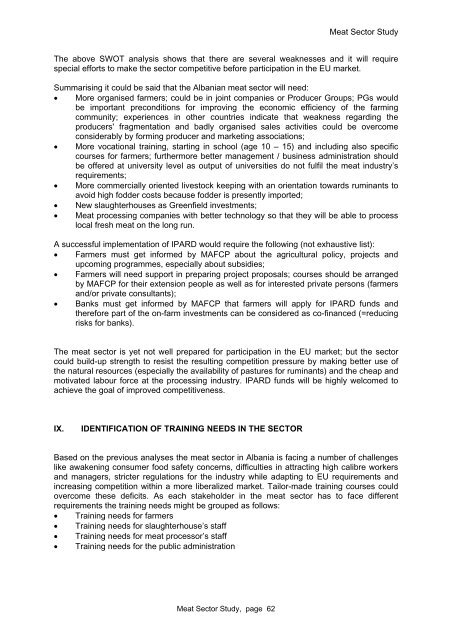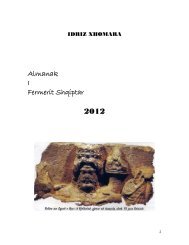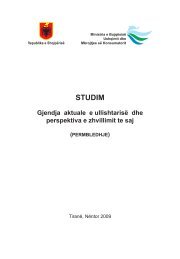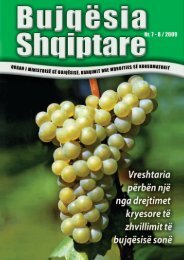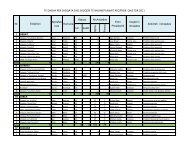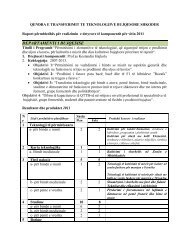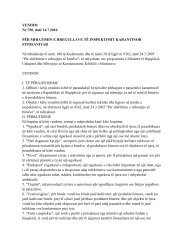MEAT Sector Analyse
MEAT Sector Analyse
MEAT Sector Analyse
- TAGS
- sector
- analyse
- mbumk.gov.al
Create successful ePaper yourself
Turn your PDF publications into a flip-book with our unique Google optimized e-Paper software.
Meat <strong>Sector</strong> Study<br />
The above SWOT analysis shows that there are several weaknesses and it will require<br />
special efforts to make the sector competitive before participation in the EU market.<br />
Summarising it could be said that the Albanian meat sector will need:<br />
• More organised farmers; could be in joint companies or Producer Groups; PGs would<br />
be important preconditions for improving the economic efficiency of the farming<br />
community; experiences in other countries indicate that weakness regarding the<br />
producers' fragmentation and badly organised sales activities could be overcome<br />
considerably by forming producer and marketing associations;<br />
• More vocational training, starting in school (age 10 – 15) and including also specific<br />
courses for farmers; furthermore better management / business administration should<br />
be offered at university level as output of universities do not fulfil the meat industry’s<br />
requirements;<br />
• More commercially oriented livestock keeping with an orientation towards ruminants to<br />
avoid high fodder costs because fodder is presently imported;<br />
• New slaughterhouses as Greenfield investments;<br />
• Meat processing companies with better technology so that they will be able to process<br />
local fresh meat on the long run.<br />
A successful implementation of IPARD would require the following (not exhaustive list):<br />
• Farmers must get informed by MAFCP about the agricultural policy, projects and<br />
upcoming programmes, especially about subsidies;<br />
• Farmers will need support in preparing project proposals; courses should be arranged<br />
by MAFCP for their extension people as well as for interested private persons (farmers<br />
and/or private consultants);<br />
• Banks must get informed by MAFCP that farmers will apply for IPARD funds and<br />
therefore part of the on-farm investments can be considered as co-financed (=reducing<br />
risks for banks).<br />
The meat sector is yet not well prepared for participation in the EU market; but the sector<br />
could build-up strength to resist the resulting competition pressure by making better use of<br />
the natural resources (especially the availability of pastures for ruminants) and the cheap and<br />
motivated labour force at the processing industry. IPARD funds will be highly welcomed to<br />
achieve the goal of improved competitiveness.<br />
IX. IDENTIFICATION OF TRAINING NEEDS IN THE SECTOR<br />
Based on the previous analyses the meat sector in Albania is facing a number of challenges<br />
like awakening consumer food safety concerns, difficulties in attracting high calibre workers<br />
and managers, stricter regulations for the industry while adapting to EU requirements and<br />
increasing competition within a more liberalized market. Tailor-made training courses could<br />
overcome these deficits. As each stakeholder in the meat sector has to face different<br />
requirements the training needs might be grouped as follows:<br />
• Training needs for farmers<br />
• Training needs for slaughterhouse’s staff<br />
• Training needs for meat processor’s staff<br />
• Training needs for the public administration<br />
Meat <strong>Sector</strong> Study, page 62


